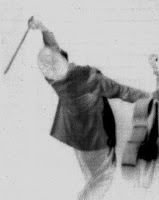
"I think often the world thinks Christians don’t feel pain or try to hide their pain behind the smiles. In the case of the latter I think it is almost certainly true of some Christians and churches today – and some churches are like that too.I've already posted about my thoughts that a real spirituality must deal both with tears of sadness and of joy. Our communities of faith must be places where mourning is as important as celebrating. If we are unable to cry together what hope is there? If we can't cry in the passion of Christ how can we truly celebrate the resurrection of Jesus. It's not that complex. Strangely at this moment I am reminded of the work of Scottish architect and designer Charles Rennie Mackintosh. I think within its linear and curved style I find a certain sadness in the simplicity. The Arts and Crafts chair in juxta-position with the cello.We need to be honest with people about our pain and our frustrations. We need to be honest about our weakness. But the difference is then that we can show people that there’s a safe, positive way of dealing with it and getting real healing and support. A place where its okay to feel pain. We need to be honest that we don’t always understand pain, why suffering happens, that we can’t always explain it – but that despite we still have faith that God has felt that pain through Jesus and can deal with it with us. Despite our pain, we can still praise God.
That’s a powerful message to a world full of pain.
It’s a big challenge for us all. Can we rise to it?"
















